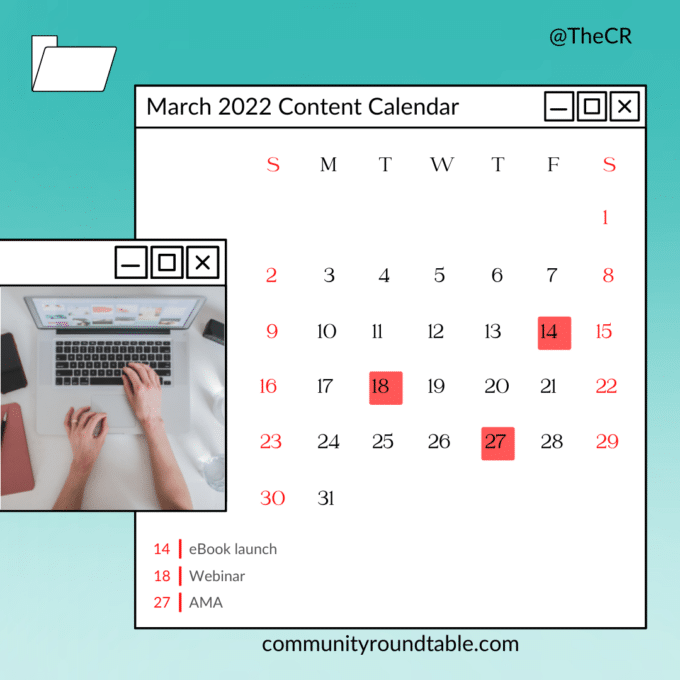Our State of Community Management research has shown that 69% of community programs count content and programming in their community metrics, but only 6% of their budgets go to online community content and programming. Content and programs are the lifeblood of a successful community program. Content gives people a reason to visit (and return to) a community, while programs create opportunities for members to connect with one another. Content and programs need to reflect the shared value of community, and a program plan tied more closely to strategy can generate the most valuable engagement behaviors.
Despite the importance of consistent content and programs in a community strategy, a staggering 60% of respondents report at best they have “an informal schedule” for content and programs in their community. While responsiveness to short-term member needs is important, we recommend being intentional about your content and program plan and connecting it to your community strategy and annual roadmap.
Here are five ways to plan effective content and programming for your online community:

1 – It’s All About The Planning Our #1 advice? Create (and use!) editorial calendars. They don’t need to be complex, but even a simple editorial calendar helps to create a routine. Choose different options like content mediums, cadence, times, structures. This keeps things fresh but also helps you understand what works best for your community
Leave room for freeform content and programming. Sometimes people make spur-of-the-moment suggestions or an event is put together last minute. It’s important to leave room in your calendar for these so you’re not feeling overwhelmed and the community isn’t feeling crowded. It’s okay to have some empty days or weeks! In fact, we recommend it.
2 – Try, Adapt, And Try Again Be flexible with your ideas (easier said than done, we know!) You may love something but your members might not – and that’s ok. Don’t take a lack of interest personally, and be ready and willing to try something, edit your plan, try it again, and so on. Something not working at first doesn’t mean it’s a total loss – it’s just not the right fit at the time. Don’t give up, it often takes more than one try to get something to work, so keep trying
The hardest part of putting about a program you love but doesn’t get traction? Accepting defeat Not every programming idea will work, be okay with every community. Your ”failures” aren’t failures at all, but learning experiences to help you figure out what does and doesn’t work with your members.
3 – Meet Your Members Where They Are – This seems obvious, but we have to say it, “Talk to you members. And when they talk, LISTEN!” You (probably) are not psychic, so there is nothing wrong with asking them what they want. Make time for regular opportunities or touchpoints for members to request content or programs or make suggestions
When listening, keep accessibility in mind. No one knows who your members are and where they’re coming from (literally and figuratively) better than you. Are you working with a global community? Make sure you vary programming time zones understand holidays in different countries. Every community should consider accessibility for differently-abled members. Make sure you consider design for screen readers, sub-titles on videos, and transcripts as part of your content and programming planning.
4 – Show Me The Data – Almost every community platform has metrics for even the newest data consumer. Use this community data to guide tactical decisions. You may think didn’t work anecdotally, but make sure data backs that up It may surprise you and show you something that you didn’t know. An example would be a live program that low attendance, but high downloads or asynchronous views.
You should also use overall metrics to inform your content and programming ideas. What topics are your members focusing on? Use community metrics to glean insight into what would resonate with your members right now. If people are searching for “new member programs”, then creating content/programming around new member programs would be smart.
5 – Reduce, Reuse, Recycle – The four points above are a lot. When getting started small steps are ok. Maybe you don’t need to have a full editorial calendar, so start with a quarterly outline. It’s important to make sure what you’re doing is scalable, so find others who can help!
Another easy win is finding ways to repurpose your own and SME’s content. Did someone lead a webinar? Post the recording in full and then edit it into clips that you can feature as standalone videos, blog post content, and in newsletters or on social. When you’re creating new content try to make sure at least some of your content is evergreen This means it won’t get stale or outdated and can be updated easily if needed. You want to have content you’ll be able to reuse at key moments/events or use repeatedly.
Our research shows community programs cultivate new behaviors that streamline workflows, connect members around the world, improve sentiment, and change the culture. They support broad communication and behaviors that apply to every individual and function across myriad use cases. Finding the right content and programming mix for your community may seem overwhelming, but you can use the five ideas above to plan effective content and programs that align with your strategic community goals.
